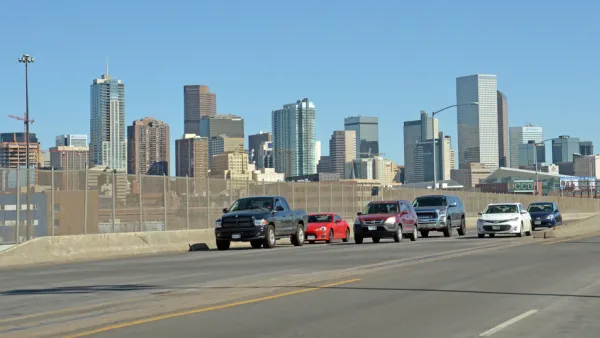The senate majority leader made clear that a mileage fee is not in the state's future. Diverting a half cent from the sales tax to the transportation budget took pressure off finding a sustainable solution to the state's transportation funding crisis
One thing appears clear in Connecticut when it comes to transportation funding: the Road Usage Charge is Not the Future of Road Funding.
"A proposal to charge state motorists by the amount of miles they drive on Connecticut roads has been rejected by Democratic leaders of the House and Senate," writes Ken Dixon for CT Post.
Senate Majority Leader Bob Duff indicated the road usage charge, the basis of the Oregon plan launched July 1 that transportation policymakers throughout the country have been eyeing, will not be part of "Gov. Dannel P. Malloy’s proposed $100 billion, 30-year plan to overhaul the state transportation and transit infrastructure."
In an August 7 statement, Duff said that in "addition to current sources of revenue from fuel taxes, there’s a new law dedicating 0.5 percent of the state’s 6.35 percent sales tax to transportation."
However, that sales tax is another example of a "diversion"—rather than increasing dedicated transportation funding like the gas tax, policy makers opt to divert existing revenue streams. Ironically, Mobilizing the Region asks, "Where's the lockbox?" to prevent diversion from the transportation budget.
Duff made clear his opposition to a mileage fee in his August 7 press release:
One of the ideas that recently garnered attention was the notion of a “mileage tax” that would be charged to residents based on the number of miles they drive in a certain period of time. This is an unproven idea. I am opposed to it and know that there is no appetite amongst Senate Democrats to advance this idea should a formal recommendation come from the governor’s panel.
Meanwhile, the a long-term solution to transportation funding remains elusive, reports Keith M. Phaneuf of The Connecticut Mirror, a nonprofit, nonpartisan news outlet.
The state's Transportation Finance Panel, "which includes transportation advocates from both sides of the aisle, is studying how numerous states finance transportation," writes Phaneuf. "That means research into many examples of tolling, fuel taxes, project-labor agreements, public-private partnerships and various other topics all-but certain to spark intense debate."
(Chairman Cameron Staples, a New Haven Democrat and former state representative) was referring to a verbal sparring match that developed over research into a “mileage tax” – a system being tested in Oregon that levies a charge against residents for each mile they drive.
Phaneuf writes that Huff's opposition to the mileage charge was a response from a Republican attack on the funding option, while House Speaker Brendan Sharkey's noted that no one was even proposing such a charge. Was Huff too quick to condemn the road usage charge before it had even been discussed?
Phaneuf references "a new report Tuesday from the New England Public Policy Center, a think-tank affiliated with the Federal Reserve Bank of Boston, (that) tackled the controversial subject of gasoline taxes."
From introduction: "This research compares existing gas taxes in the New England states and examines alternative tax structures that could improve fiscal sustainability."
Links to past Planetizen posts on Connecticut's fuel tax can be found below under "related." Interestingly, the state's diesel tax dropped 4.2 cents on July 1.
FULL STORY: Majority leaders oppose ‘mileage’ tolls

Analysis: Cybertruck Fatality Rate Far Exceeds That of Ford Pinto
The Tesla Cybertruck was recalled seven times last year.

National Parks Layoffs Will Cause Communities to Lose Billions
Thousands of essential park workers were laid off this week, just before the busy spring break season.

Retro-silient?: America’s First “Eco-burb,” The Woodlands Turns 50
A master-planned community north of Houston offers lessons on green infrastructure and resilient design, but falls short of its founder’s lofty affordability and walkability goals.

Test News Post 1
This is a summary

Analysis: Cybertruck Fatality Rate Far Exceeds That of Ford Pinto
The Tesla Cybertruck was recalled seven times last year.

Test News Headline 46
Test for the image on the front page.
Urban Design for Planners 1: Software Tools
This six-course series explores essential urban design concepts using open source software and equips planners with the tools they need to participate fully in the urban design process.
Planning for Universal Design
Learn the tools for implementing Universal Design in planning regulations.
EMC Planning Group, Inc.
Planetizen
Planetizen
Mpact (formerly Rail~Volution)
Great Falls Development Authority, Inc.
HUDs Office of Policy Development and Research
NYU Wagner Graduate School of Public Service



























